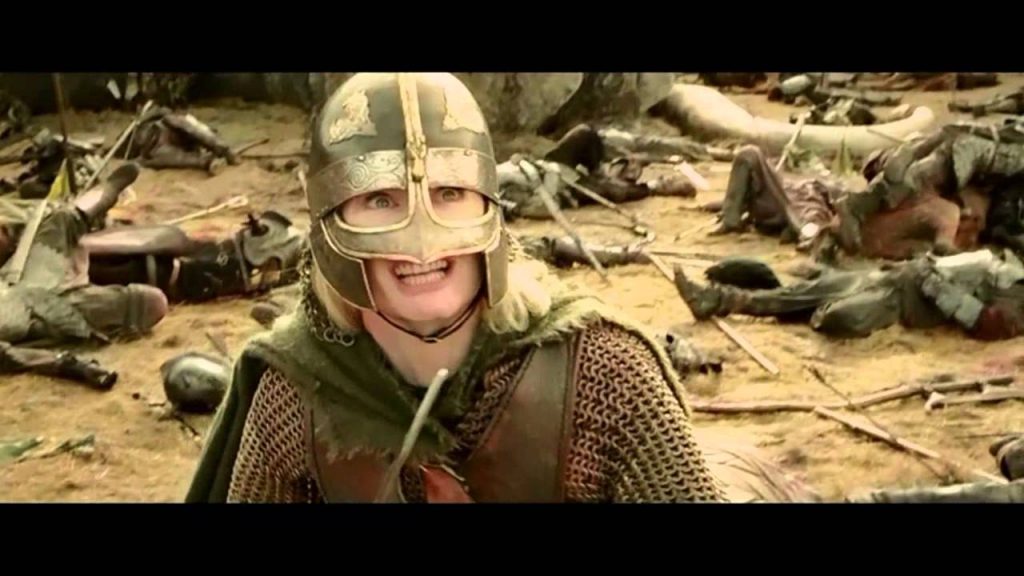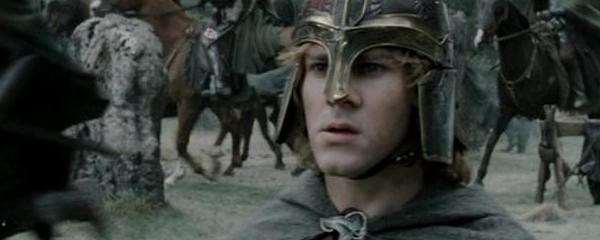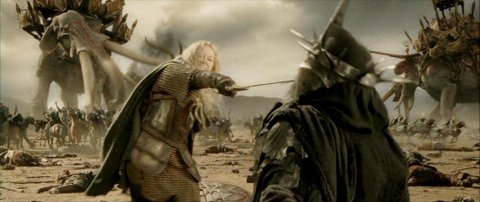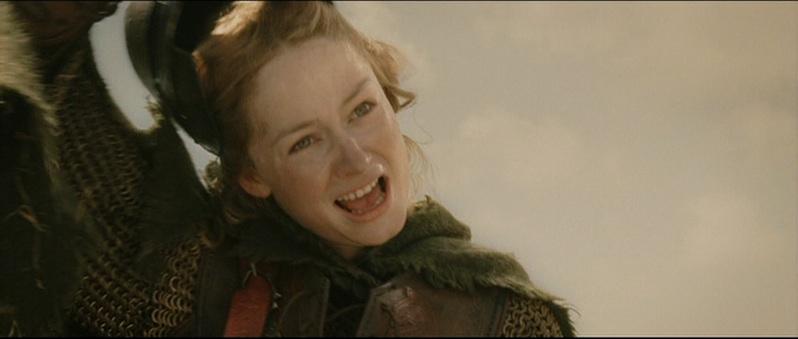Courage in the Face of Doom: The Unlikely Heroes of The Lord of the Rings: The Return of the King (2003)
One of the most striking aspects in The Lord of the Rings: The Return of the King (2003) stems from its sheer dedication to battle. A lot of time and love very obviously went into the sets, costumes and props alone, but once those aspects get coupled with the writing, it’s next level. Yes, there are moments of heroism, such as Gandalf (Ian McKellan) riding into battle on his beautiful horse to save the day. However, some of the harsh realities of war get explored – particularly the complete and utter fear going into battle unexperienced, as typified by Merry (Dominic Monaghan) and Éowyn (Miranda Otto). In fact, it’s this complete fear coupled with the fact that they’re nontraditional soldiers that really make them the rousing faces of courage in war.

Much like Dante Hicks in Clerks (1994), Éowyn and Merry weren’t even supposed to be here today. The pair are told in a rather patronizing manner that their place is not in battle, as Merry is of a petite stature and Éowyn is female. However, each has their own reasons for wishing to enter the fight. For Merry, it’s both as a member of the Fellowship – a mark of his dedication to the cause of destroying the one ring – paired with his desire to be closer to his best friend, Pippin (Billy Boyd), who is in Minas Tirith because, well, he screwed up and peeped into Sauron’s battle plan to destroy the Gondor city. The thought is that Merry is just going to get in the way, and therefore, he should just stay out of it because he’s got a history of screwing things up (see: the fireworks debacle in the first film). Éowyn’s cause is driven far more by sexism: her uncle, Théoden (Bernard Hill), tells her to stay home and look after the women and children. The implication: she should keep the fires whilst the men folk go and fight, despite that she can handle a sword and felt poorly sitting out the Battle of Helm’s Deep. Feeling salty, she concocts a plan with Merry to disguise themselves and join the fight.

Here’s where it gets both real and inspiring. The pair looks petrified as the battle begins, clutching onto one another and assuring each other that they’ll stick together. You can tell that they are way the hell out of their depth as the reality of going into battle looms by the looks of pure terror on both Monaghan and Otto’s faces: they’re wide-eyed and clenching their jaws and weaponry. It’s not much better once the fight starts. They fight orcs double to triple their size. They encounter armed elephants. And then it happens: Théoden gets the crap kicked out of him by the Witch King and is moments away from being dragon food when Éowyn steps in and starts fighting for her uncle. She’s visibly terrified and shaken as she starts the fight, wearing an “oh shit” expression if there ever was one. When the Witch King informs her in a cocky manner that no man can kill him, Merry sneaks up behind him and delivers a sword to his back, giving Éowyn enough time to unmask herself as female and stab him in the face (which is really sort of the dream when dealing with a villain that thinks he’s unstoppable).

Total honesty: when I saw this film opening night, the applause at the moment of Éowyn’s “I am no man” pronouncement was thunderous. People in the entire cinema cheered and clapped and hollered for her. You don’t get that kind of reaction with a character that doesn’t strike a chord, and she does so for a reason: she refuses to sit down and be quiet when she’s told, and even though she’s scared, she keeps with it to fight for the people who matter to her. We get to see someone completely scared take a stand, and it’s realistic because scary things happen and we’re not always wearing a brave face throughout the experience. When someone is entirely brave and stoic without flinching, it means that they have no fear – there’s nothing to conquer within themselves. When someone is terrified, that places us on the same level as them; much as we don’t want to admit it, many of us would be equally terrified at taking that stand. The fact that the head of the Nazgûl gets taken down by a scared woman the king told to stay home and a ballsy Hobbit who likes food and fucking around with fireworks just makes the whole thing even better: not even the best warriors could take this guy down, and yet these two scared people wiped him out.

Even more touching: after the Witch King has been dispatched and her beloved uncle has kicked off, Éowyn crawls on the battlefield toward Merry, still intent on keeping her promise to remain close to him. It would have been far easier to collapse and let him be found by another fighter, but she still managed to go after him; she still had his back, even when there was pure carnage and chaos around them. The long-held definition of courage entails continuing on even when you’re scared; Éowyn and Merry certainly have that attribute down to a science. We should look to them as a reminder that even if someone says you’re not up to the task – and even if the task terrifies you and you’re tiny and supposedly insignificant – you should keep going if you’ve got the drive. That’s the kind of person you want going into battle with you.
